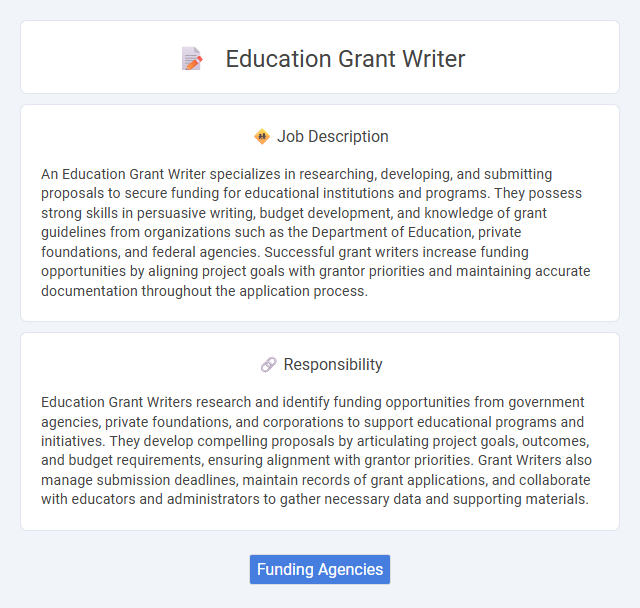
An Education Grant Writer specializes in researching, developing, and submitting proposals to secure funding for educational institutions and programs. They possess strong skills in persuasive writing, budget development, and knowledge of grant guidelines from organizations such as the Department of Education, private foundations, and federal agencies. Successful grant writers increase funding opportunities by aligning project goals with grantor priorities and maintaining accurate documentation throughout the application process.
Individuals with strong writing skills and a passion for educational causes are likely suitable for an Education Grant Writer position. Those who thrive under deadlines and possess attention to detail probably find this role fitting, as it often requires crafting precise and persuasive proposals. Conversely, people struggling with multitasking or lacking interest in educational funding may face challenges adapting to the job's demands.
Qualification
A successful Education Grant Writer must possess strong research and writing skills, combined with a deep understanding of educational funding sources and grant application processes. Expertise in crafting clear, persuasive proposals aligned with educational goals and compliance standards is essential. Proficiency in budget development, project management, and adherence to deadlines enhances the ability to secure funding effectively.
Responsibility
Education Grant Writers research and identify funding opportunities from government agencies, private foundations, and corporations to support educational programs and initiatives. They develop compelling proposals by articulating project goals, outcomes, and budget requirements, ensuring alignment with grantor priorities. Grant Writers also manage submission deadlines, maintain records of grant applications, and collaborate with educators and administrators to gather necessary data and supporting materials.
Benefit
Education grant writers likely increase funding opportunities for schools and educational programs, enhancing resources and support for students. Their expertise in crafting compelling proposals may improve the chances of securing grants, which can lead to program expansion and innovation. Organizations hiring these professionals probably experience better financial stability and growth in educational initiatives.
Challenge
The Education Grant Writer role likely involves navigating complex funding criteria and adapting proposals to meet diverse educational program requirements. Challenges may include staying updated with changing grant policies and aligning project objectives with funding priorities. Success in this position probably depends on strong research skills and the ability to persuasively communicate the educational impact of proposed initiatives.
Career Advancement
Education grant writers play a critical role in securing funding for schools, nonprofits, and educational programs, leveraging expertise in proposal development and budget management. Advancing in this career often involves gaining specialized knowledge in education policy, mastering grant research tools, and expanding networks with funding agencies to increase success rates. Senior positions may include managing teams, developing strategic funding plans, and influencing educational program outcomes through targeted grant acquisitions.
Key Terms
Funding Agencies
Education grant writers specialize in securing financial support from funding agencies such as the Department of Education, National Science Foundation, and private foundations like the Bill & Melinda Gates Foundation. They develop detailed proposals that align with the strategic goals of these agencies, emphasizing measurable outcomes in student achievement and program effectiveness. Expertise in navigating agency-specific guidelines and deadlines is crucial to maximize award success rates.
 kuljobs.com
kuljobs.com